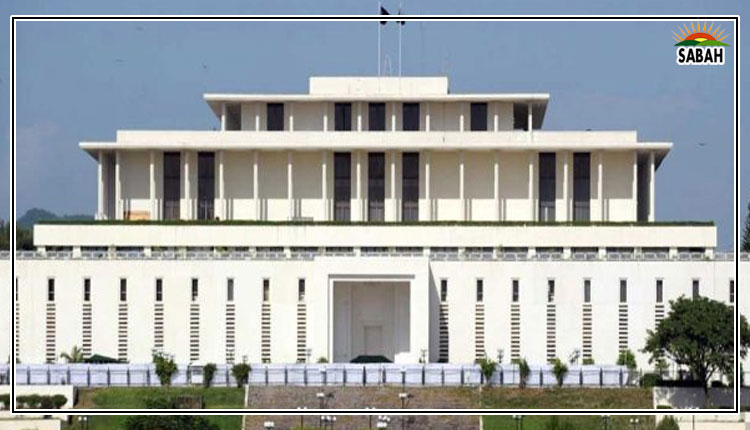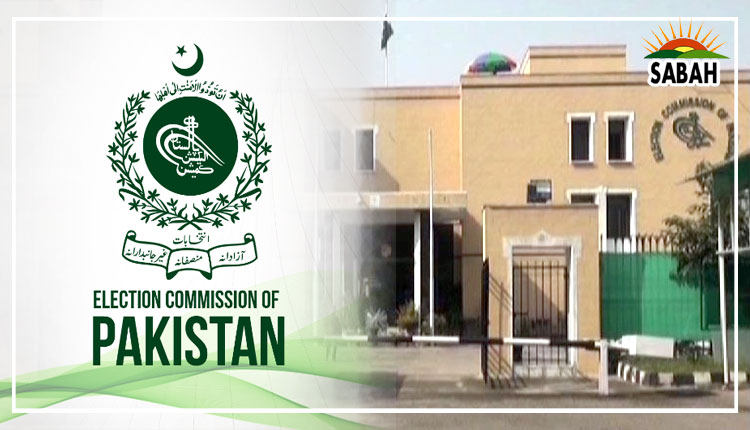Election Commission of Pakistan dismisses references against 20 PTI dissident MNAs
ISLAMABAD, May 11 (SABAH): The Election Commission of Pakistan (ECP) on Wednesday dismissed the Pakistan Tehreek-e-Insaf’s references seeking the disqualification of its 20 dissident members of the National Assembly.
A three-member bench headed by Chief Election Commissioner (CEC) Dr. Sikandar Sultan Raja and comprising Shah Muhammad Jatoi and Nisar Ahmed Durrani reserved its decision earlier after hearing arguments from all sides — the PTI and the lawyers of the dissident MNAs.
Ex-prime minister and PTI Chairman Imran Khan had sent a declaration to former National Assembly speaker Asad Qaiser seeking the disqualification of 20 party members.
In Wednesday’s short verdict, the Election Commission of Pakistan unanimously said the declaration filed against the MNAs was not found in accordance with the Constitution of Pakistan.
During the hearing earlier on Wednesday, the ECP rejected the request to accept any more records from PTI.
PTI’s lawyer Faisal Chaudhry requested the court to provide a copy of the reserved verdict, saying that he will appeal against it.
He maintained that the dissidents had opposed PTI’s request to provide more records. “Some things couldn’t be brought on record properly,” Faisal said.
He said that he believes that he is no more needed and that his case has become biased.
While presenting his arguments, Noor Alam Khan’s lawyer Gohar Khan maintained that Article 63(A)1 does not apply to Noor.
“The show-cause notice issued by the PTI secretary-general doesn’t have legal status. Therefore, Noor is still a PTI member,” Gohar argued.
He informed ECP that Noor had stated in response to PTI’s show-cause notice that he has neither left PTI nor its parliamentary party.
He said that the party responded to the reply with directives not to vote on the no-confidence motion against then prime minister Imran Khan. “This proves that the party recognised Noor as its member,” Gohar said.
He went on to say that Noor attended the meeting on April 3 as per the party’s directives to ensure attendance. After this, the party didn’t issue any other directive restricting Noor from attending its meetings.
Gohar contended that his client didn’t join any other political party but the media gave an impression that Noor violated the party policy.
When asked if Noor cast a vote on the day of voting on the no-confidence motion, Gohar responded in the negative.
Meanwhile, ECP bench member Nasir Ahmed Durrani inquired how it was concluded that only a five-member bench of the Commission can announce the verdict.
At this, Gohar replied that the Supreme Court has declared that only a full court of ECP can announce a verdict in a disqualification case. With this, Gohar completed his arguments.
The PTI had filed references against 20 MNAs seeking their disqualification under Article 63-A of the Constitution ahead of the no-trust vote against then premier Imran Khan.
The PTI had filed references against MNAs Noor Alam Khan, Dr. Mohammad Afzal Khan Dhandla, Nawab Sher Waseer, Raja Riaz Ahmed Khan, Malik Ahmed Hussain Deharr, Rana Mohammad Qasim Khan Noon, Chaudhry Asim Nazeer, Sardar Amjad Farooq Khan Khosa, Aamir Liaquat Hussain, Chaudhry Farrukh Altaf, Syed Mobeen Ahmed, Sayed Sami-ul-Hassan Gillani, Mohammad Abdul Ghaffar Wattoo, Sayed Basit Ahmad Sultan Bukhari, Aamir Talal Gopang, Sardar Riaz Mehmood Khan Mazari, Dr. Ramesh Kumar Vankwani, Wajiha Qamar, Nuzhat Pathan and Javeria Zafar Aheer.
The matter first came to light in March after several PTI lawmakers were found staying at the Sindh House in Islamabad ahead of the no-trust vote against then-prime minister Imran Khan, some of whom spoke to the media about their grievances with the party.
They had refuted allegations that they had been offered money to make the opposition’s no-trust move a success but said they would vote in accordance with their “conscience”.
Subsequently, the PTI had filed declarations and references against 20 members of the National Assembly, seeking their disqualification under Article 63-A of the Constitution.
Eventually, the dissident MNAs’ votes were not needed in Imran’s removal, as the opposition managed to stitch together support from government-allied political parties.
After Imran Khan was removed as prime minister on the night of April 9, his declarations against the dissident PTI MNAs were sent to the ECP on April 14 by the acting NA speaker.
Last month, the Election Commission had issued notices to the 20 MNAs, directing them to appear before it.
In their written replies, the defected MNAs said they had neither resigned from the PTI nor had joined any other political party, nor had they voted against their parties stated line.
The declaration and the reference were “baseless, unsubstantiated and vague”, one reply read.
“It has been actuated by bad faith in order to suppress a voice of dissent within the party lines. Such actions are tantamount to converting the party into an authoritarian group commanded in a dictatorial mindset of one individual,” the reply said.
Another reply submitted to the ECP said the reference and the declaration did not fulfil the mandatory requirements under Article 63-A.
According to Article 63-A of the Constitution, a parliamentarian can be disqualified on grounds of defection if he “votes or abstains from voting in the House contrary to any direction issued by the parliamentary party to which he belongs, in relation to election of the prime minister or chief minister; or a vote of confidence or a vote of no-confidence; or a money bill or a Constitution (amendment) bill”.
The article says that the party head has to declare in writing that the MNA concerned has defected but before making the declaration, the party head will “provide such member with an opportunity to show cause as to why such declaration may not be made against him”.
After giving the member a chance to explain their reasons, the party head will forward the declaration to the speaker, who will forward it to the chief election commissioner (CEC). The CEC will then have 30 days to confirm the declaration. If confirmed by the CEC, the member “shall cease to be a member of the House and his seat shall become vacant”.












